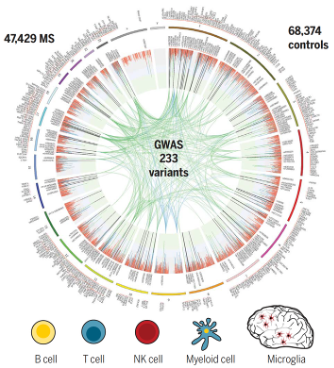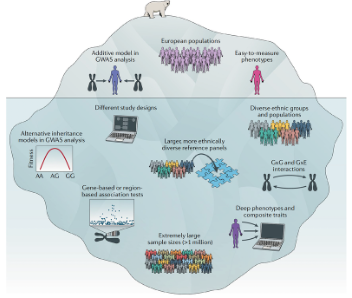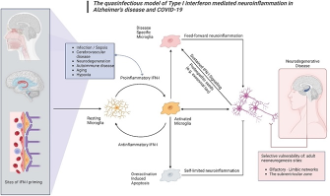 |
DEPARTMENT OF NEUROLOGY
|
“Genetic basis ofneurological diseases"Professor Georgios Hadjigeorgiou is a member of the Cyprus Academy of Sciences, Letters and Arts. He received his MD and PhD degree from Kapodistrian & National University of Athens. Currently is serving as Acting Dean, Medical school, University of Cyprus and Chair of the Department of Neurology, Nicosia General Hospital, OKYPY. Previous academic positions include Professor of Neurology/Chair of the Department of Neurology and Dean of the Faculty of Medicine, University of Thessaly, GR. He also served as Director of Neuroscience Unit and Laboratory of Neurogenetics, University of Thessaly, Greece. His postdoctoral training includes post-doctoral research fellowships at the University of Milano and the Columbia University, New York. His major research interests include: (1) the genetic basis of rare neurological diseases and genetic epidemiology of common complex neurological diseases, (2) the role of Mediterranean diet in aging and (3) pathogenesis and treatment of uremic Restless Legs Syndrome. He has extensive clinical and research experience and currently he collaborates with leading research centers and study groups abroad (Laboratory of Neurogenetics NIH/NIA, Columbia NY, GEO-PD, IMSGC, EURLSSG, etc.). Among others, he is currently site PI in the Genetic Epidemiology of Parkinson’s Disease (GEO-PD) and in International Multiple Sclerosis Genetic Consortium (IMSGC). He also served as Vice President of the European Restless Legs Syndrome Study Group (EURLSSG). He is a co-founder and member of the executive committee of the Hellenic Academy of Neuroimmunology (HELANI) and the Longitudinal Investigation of Aging and Diet (HELIAD). He has received financial support from participation in various research programs (FP7; Greek General Secretariat for Research and Technology; Cyprus Research Promotion Foundation; Alzheimer Association USA; PD Foundation, USA).
Professor Georgios Hadjigeorgiou Medical School, University of Cyprus, Acting Dean Department of Neurology, Nicosia General Hospital, Director
The role of Mediterranean diet in Aging and DementiaHe was one of the co-founders of the Hellenic Longitudinal Investigation of Aging and Diet (HELIAD) aims to investigate the role of Mediterranean diet (Md) in aging. This is a population-based, multidisciplinary, collaborative study designed to estimate the prevalence and incidence of AD, other dementias, mild cognitive impairment, and other neuropsychiatric conditions of aging in the Greek population and to investigate associations between nutrition and cognitive dysfunction/age-related neuropsychiatric diseases. HELIAD is one of few international studies in the field and recently we were invited to join the COSMIC: Cohort Studies of Memory in an International Consortium that is leading by Centre for Healthy Brain Ageing of the University of New South Wales, Sydney, Australia. Among others this study highlighted the protective role of Md for dementia and unrevealed many genetic predisposition factors for dementia
|
Genetic epidemiology ofNeurological DiseasesHis research work is divided into two phases. The first phase (1994 – 2002) is characterized by my work in the field of the genetic basis of metabolic myopathies and mitochondrial encephalomyopathies. Among others I published the first genetic defects in Cori disease (due to deficiency of the debrancher enzyme-debranching glycogen) in Europe. Moreover, I significantly contributed to the characterization of new type of genetic defect (mitochondrial DNA depletion) as the core defect for the Myo-Neuro-GastroIntestinal Encephalomyopathy syndrome (MNGIE) as well as the biochemical basis of a new recognized type of ataxia named cerebellar ataxia with CoQ10. After my appointment to an academic position I gradually moved my research interests to the field of genetic epidemiological studies for many common neurological complex diseases. After creating a well characterized DNA biobank for major neurological complex disease I was able to extensively publish in the field of candidate genetic association studies. This allowed me to be assigned as site-Principal Investigator in leading consortia in the field and though be able to participate in many major collaborative genome-wide association studies (GWAS) for these diseases. All these studies provided the so far known genetic basis of some major complex neurological diseases namely Parkinson’s disease, Alzheimer’ s disease, Multiple Sclerosis and RLS albeit GWAS performed to date represent the tip of the iceberg.
Secondary RestlessLegs SyndromeHe worked extensively in the field of pathogenesis and treatment of secondary Restless Legs Syndrome (RLS. He was founder of a research group that designed and executed randomized clinical trials that resulted in proposal for novel non-pharmacological intervention for amelioration of RLS symptoms in patients with uremic RLS. This research among others, discovered the crucial negative role of RLS in the quality of life of uremic patients as well as the negative influence on muscle and cardiac system.
|
Cognition, Neurodegeneration and ImmunityHe has worked extensively and in collaboration with Visiting Lecturer Dr Georgios Vavougios, in the development of novel biomarkers involved in the interplay between cognition, neurodegeneration and immunity. Current research involves the detection and characterization of brain-derived exosomes and their cargo, and the detection of differentially abundant proteins in patients following viral illness. Other ongoing projects involve the development of novel methods of assessing the contribution of peripheral immunity in neurodegeneration, and a bioinformatics arm that identifies shared molecular mechanisms across distinct neurodegenerative diseases.
|
|
SELECTED PUBLICATIONS
|





